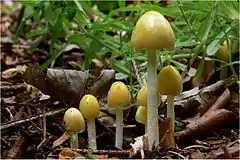Bolbitius titubans
Bolbitius titubans, also known as Bolbitius vitellinus, is a widespread species of mushroom found in America and Europe. It grows chiefly on dung or heavily fertilized soil, and sometimes on grass. It is nonpoisonous.[1]
| Bolbitius titubans | |
|---|---|
 | |
| Scientific classification | |
| Kingdom: | |
| Division: | |
| Class: | |
| Order: | |
| Family: | |
| Genus: | |
| Species: | B. vitellinus |
| Binomial name | |
| Bolbitius titubans (Bull.) Fries | |
| Synonyms | |
Description
The mushroom cap is between 1.5–7 cm,[2] and grows from egg-shaped when young to broadly convex, finally ending up nearly flat.[3] The cap's color starts yellow or bright yellow, and fades to whitish or greyish with age.[4] The gills are free from the stem or narrowly attached to it, are fragile and soft, and fade from whitish or pale yellowish to rusty cinnamon with age.[3] The stem is 3–12 cm tall and 2–6 mm wide,[2] is whitish-yellow with a fine mealy powdering, and is very delicate.[5] The spores are brown, elliptical, and smooth.[2]
The mushroom's edibility is unknown but it is too small to be worthwhile.[2]
A similar species is Bolbitius aleuriatus.[2]
References
- Miller Jr., Orson K.; Miller, Hope H. (2006). North American Mushrooms: A Field Guide to Edible and Inedible Fungi. Guilford, CN: FalconGuide. p. 270. ISBN 978-0-7627-3109-1.
- Davis, R. Michael; Sommer, Robert; Menge, John A. (2012). Field Guide to Mushrooms of Western North America. Berkeley: University of California Press. p. 248. ISBN 978-0-520-95360-4. OCLC 797915861.
- Kuo, Michael (February 2012). "Bolbitius titubans". Retrieved October 31, 2013.
- "California Fungi—Bolbitius titubans". Retrieved October 31, 2013.
- "Rogers Mushrooms — Bolbitus vitellinus Mushroom". Archived from the original on December 5, 2008. Retrieved October 31, 2013.